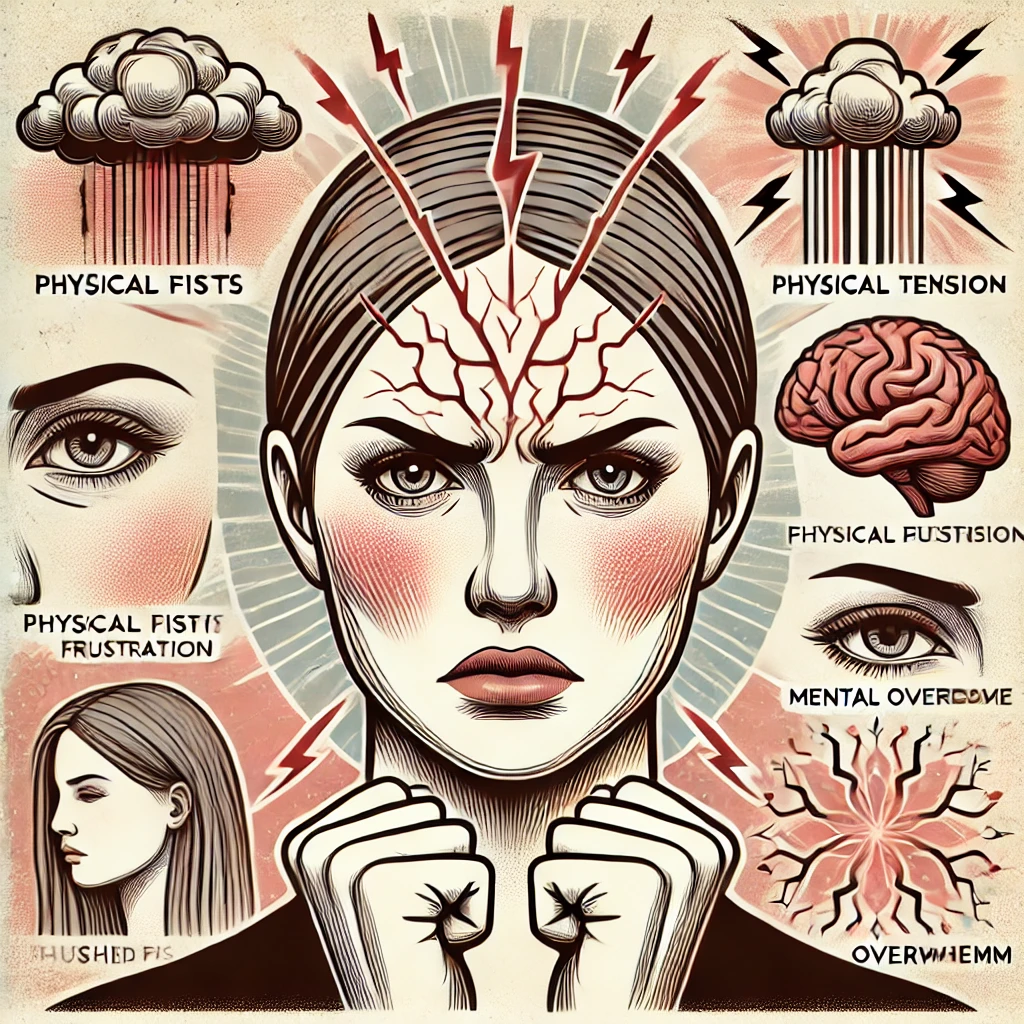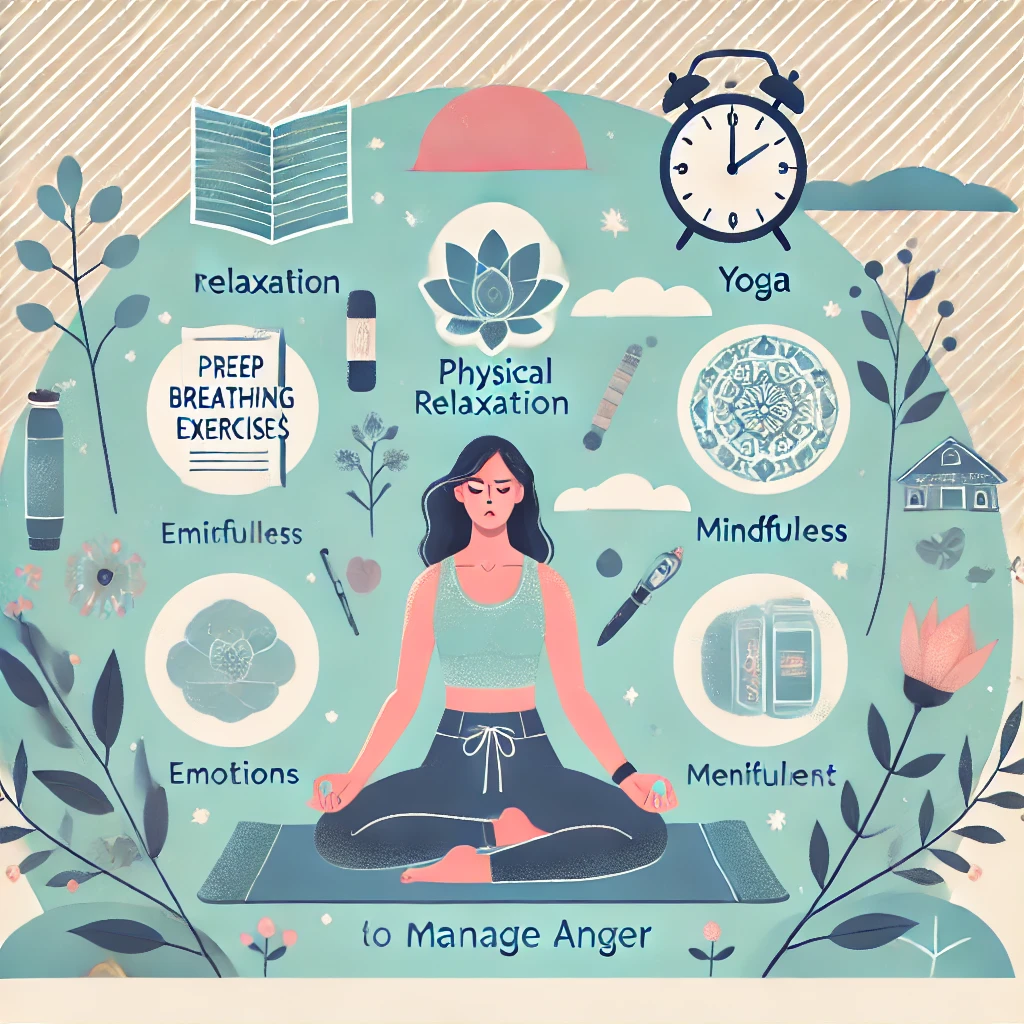Struggling with anger? Anger problems can disrupt your life and relationships if not managed. This article helps you identify signs of an anger problem, understand its causes, and offers strategies to control your anger.
Key Takeaways
- Understanding the root causes and triggers of anger is essential for effective management and preventing harmful expressions.
- Common signs of anger issues include frequent irritability, aggressive behavior, and emotional symptoms such as negative self-talk.
- Professional help and effective coping strategies, such as cognitive behavioral therapy and relaxation techniques, are crucial for managing anger and protecting personal relationships.
Understanding Your Anger Problem

Experiencing anger is not inherently negative. It’s a natural and instinctive reaction that often arises to protect us from perceived threats. It serves as an alert system, highlighting situations we find unfair or dangerous and motivating us to act in defense of ourselves. When this emotion leads to harmful expressions such as regrettable actions or words, its impact becomes concerning. In its most severe form, uncontrolled anger may even result in verbal outbursts or physical violence—situations which typically leave behind lingering feelings of resentment.
To tackle issues with rage effectively requires an understanding of what specifically sets off your anger alongside the destructive thought patterns that propel your emotional reactions. Instead of stifling these emotions superficially, it’s crucial to examine their deeper roots thoroughly. Managing one’s temper includes recognizing individual triggers and devising strategies for responding constructively rather than destructively. The origins of problematic anger can be varied but are frequently associated with trauma like bereavement or psychological challenges linked to mental health conditions.
By acknowledging the sources fueling our fury and grasping why it manifests within us lays the groundwork necessary for employing practical techniques designed for temper regulation. Grasping these dynamics equips individuals with resources needed for moderating their response proactively so that they maintain dominion over their sense of ire instead of being governed by unpredictable bouts of intensity.
Common Signs of Anger Issues

Recognizing the prevalent indicators of anger issues is an essential initial step in tackling them. Consistent experiences of anger over seemingly minor matters may suggest a deeper problem with managing one’s anger. Those suffering from such problems often respond aggressively and exhibit little patience for errors, becoming unduly enraged when faced with challenging situations.
Physical violence stands out as a stark indicator of uncontrolled fury, potentially causing harm to both oneself and others. Another typical manifestation associated with oppositional defiant disorder is verbal aggression, which includes using severe language, shouting, and verbally lashing out at people around you. These actions reflect not just potential danger, but also demonstrate a failure to accept personal accountability by frequently attributing their fits of rage to external factors.
Additional signs encompass persistent irritability and the propensity to react excessively to small provocations—behavior that can severely strain relationships as those close might feel compelled to tread carefully so they don’t spark an episode of wrath. Recognizing these symptoms is crucial on the path towards learning how best to manage and lessen episodes of unchecked anger.
Root Causes of Anger Problems
Understanding the fundamental reasons behind anger issues is crucial for their successful control. Various mental health conditions, including bipolar disorder and intermittent explosive disorder, can manifest through episodes of anger. Experiences such as trauma, ongoing conflicts without resolution, and a sense of powerlessness often play significant roles in the development of these anger problems.
Frequently, unfulfilled expectations or feelings that one has been treated unfairly within personal or professional settings trigger an angry reaction. Persistent stress from sources like work pressures, relationship troubles, or monetary strains can intensify difficulties with managing emotional reactions. Childhood environments marked by exposure to violent behavior or neglect may pave the way for persistent challenges related to anger later in life.
People who naturally exhibit high levels of impulsiveness might be more prone to struggle with controlling their temper. Acknowledging these various influences is essential for individuals as they strive to pinpoint what specifically ignites their own bouts of rage and seek out more impactful strategies for mastering their responses regarding anger management.
Emotional Symptoms of Anger
Anger can manifest through internal symptoms that have a significant impact on one’s mental health, often escaping outward detection. Repeated experiences of disproportionate anger in response to minor irritations could signal deeper issues with managing anger and might be symptomatic of an associated mental health condition. Internalizing this negative emotion typically results in detrimental self-criticism over perceived shortcomings.
This inwardly directed anger contributes to distorted thinking patterns which may culminate in unreasonable emotional eruptions. Such cycles of negativity impair not only self-perception but also interpersonal relationships. Employing Cognitive Behavioral Therapy (CBT) has proven valuable for reshaping these destructive thought processes and improving the ability to regulate anger effectively.
Feelings related to grief-induced fury or resentment over losses, including blaming oneself for problems within personal connections, are common emotional reactions linked with mourning. Acknowledging these signs is crucial when seeking solutions tailored towards addressing fundamental causes and implementing strategies designed specifically for better handling feelings of rage.
Physical Symptoms of Anger

When experiencing anger, the body immediately enters a ‘fight or flight’ response, marked by an outpour of stress hormones that can influence both heart rate and blood pressure. This reaction poses potential long-term health risks.
During episodes of anger, one may typically encounter several physical symptoms such as:
- A quickened heartbeat
- Teeth clenching
- Tensed muscles
- Headaches caused by tension
- Perspiration
- Light-headedness
- Upset stomach
Persistently holding onto anger could pave the way for various medical conditions to arise, including but not limited to:
- Cardiac disease
- Elevated blood pressure levels
- Cardiovascular complications
- Type 2 diabetes
It is essential to recognize these bodily responses associated with anger in order to fully grasp its comprehensive effects on your health and take appropriate steps towards managing it effectively.
Being conscious of how your physique responds during feelings of rage allows you the opportunity to employ techniques aimed at calming both your physical state and mental disposition. Such measures are instrumental in diminishing the likelihood of enduring adverse health outcomes related to chronic experiences of anger.
Impact on Personal Relationships
Uncontrolled anger can have a devastating impact on personal relationships. It often makes trust difficult and damages communication, creating an environment of fear and tension. Passive-aggressive behaviors, such as giving the silent treatment, indicate an inability to express anger directly and can harm relationships.
Frequent anger can result in partners feeling like they must tread carefully to avoid triggering an outburst, leading to relationship problems. Verbal abuse caused by anger issues can lead to emotional harm and damage trust, making it difficult for partners to feel safe and valued. Anger issues can create an environment of fear, causing partners to suppress their own feelings to maintain peace.
Acquiring conflict resolution skills and improving communication can better manage anger-related relationship issues. Fostering respectful expression of feelings allows couples to prevent angry outbursts and build healthier relationship dynamics.
Techniques to Manage Anger

To manage anger successfully, a variety of methods and tactics should be utilized. Relaxation strategies such as progressive muscle relaxation and guided imagery help ease the physical stress associated with anger. Employing deep breathing techniques, practicing mindfulness, and participating in physical exercise are also effective for controlling feelings of anger.
Therapeutic interventions like Cognitive-Behavioral Therapy (CBT) and workshops to improve communication skills are beneficial when dealing with anger issues. Undertaking cognitive restructuring facilitates more effective control over one’s reactions to anger. Enhancing communication reduces the chance that situations may escalate into intense bouts of rage, thereby promoting healthier interactions within relationships.
When conveying feelings of displeasure, it is crucial to discuss issues calmly without resorting to offensive language or insults. By recognizing specific triggers that provoke angry responses, individuals can better navigate their emotional responses under stress or confrontation with frustration.
Concentrating on finding resolutions rather than dwelling on the issue aids in tempering angry emotions.
Practicing forgiveness and methods designed for releasing resentment assists in shedding long-held grudges which can lighten the emotional load carried by those enduring chronic ire. Incorporating these practices regularly leads people towards more adept management of their tempers while enhancing their general sense of well-being.
Seeking Professional Help
Seeking professional assistance is a critical step for individuals grappling with anger issues. If left unchecked, uncontrolled anger can intensify mental health problems and cause turmoil in personal relationships. Consulting with a mental health professional can help mitigate the adverse effects of anger on interpersonal connections and enhance overall emotional health.
Mental health experts are equipped to devise personalized techniques for managing anger effectively. Such services might encompass programs like anger management, couples’ counseling, trauma therapy, and individual psychotherapy sessions. These therapists have expertise in identifying the underlying reasons behind one’s temper flare-ups, which facilitates more successful interventions.
It’s essential to adopt practical skills such as deep breathing or pausing momentarily by counting before reacting when working towards reining in angry reactions. Mental health professionals provide a confidential environment where individuals can freely talk about their feelings and incidents linked to their anger, aiding them in better comprehending and regulating their emotions.
Legal Consequences of Uncontrolled Anger

Allowing anger to spiral out of control can have grave legal impacts, especially during instances of road rage. Engaging in road rage might lead to serious legal penalties such as assault and battery charges if altercations become physical. The aggressive driving that often accompanies road rage is seen as a traffic offense and could result in monetary fines along with points added to the motorist’s driving record.
Motorists who exhibit signs of road rage may find themselves facing criminal accusations beyond ordinary traffic infractions based on their conduct. Road rage plays a role in a substantial proportion of deadly automotive incidents. It contributes to approximately one-third of all fatal car crashes.
It is imperative to manage one’s temper effectively so as not only to steer clear of these severe legal predicaments, but also to prevent potential injuries or fatalities associated with them.
Summary
To sum up, it’s critical to acknowledge and address your anger for the sake of preserving harmonious relationships and ensuring personal health. Becoming aware of the typical indicators and fundamental reasons behind problems with anger enables you to actively pursue successful strategies for managing that emotion.
Employing methods such as practicing deep breathing exercises, embracing mindfulness, or getting assistance from a professional can greatly enhance your capacity to regulate feelings of anger. Keep in mind that mastering control over your emotions is an ongoing process. Equipped with appropriate resources and support, you are on the path towards a life characterized by greater equilibrium and satisfaction.
Frequently Asked Questions
What are common signs of anger issues?
Common signs of anger issues include frequent irritability, physical and verbal aggression, and a low tolerance for mistakes.
Recognizing these symptoms is crucial for addressing and managing anger effectively.
What are the root causes of anger problems?
Often, mental health conditions, trauma, unresolved conflicts, chronic stress, and certain personality traits are at the core of anger issues.
It is vital to recognize and tackle these fundamental problems in order to control anger successfully.
How can I manage my anger effectively?
To manage your anger effectively, utilize techniques like deep breathing, mindfulness, and cognitive-behavioral therapy while improving your communication skills.
These strategies can lead to healthier emotional responses and interactions.
When should I seek professional help for my anger?
You should seek professional help for your anger when it significantly distresses you or affects your relationships.
Addressing these issues early can lead to better outcomes.
What are the legal consequences of uncontrolled anger?
Failing to control anger can result in grave repercussions, including facing assault and battery charges or criminal offenses related to road rage incidents.
It is vital to effectively manage anger to prevent such legal outcomes.
Additional Ressources
Here are some outbound links to credible resources for a blog about identifying and managing anger problems:
- American Psychological Association (APA) – Anger Management Tips
https://www.apa.org/topics/anger/control - Mayo Clinic – Anger Management: 10 Tips to Tame Your Temper
https://www.mayoclinic.org/healthy-lifestyle/stress-management/in-depth/anger-management - HelpGuide – Anger Management: Mastering Your Emotions
https://www.helpguide.org/articles/mental-health/anger-management.htm - National Health Service (NHS) – How to Deal with Anger
https://www.nhs.uk/mental-health/feelings-symptoms-behaviours/feelings-and-symptoms/anger - Verywell Mind – Steps to Manage Anger Effectively
https://www.verywellmind.com/how-to-manage-anger-5098303





